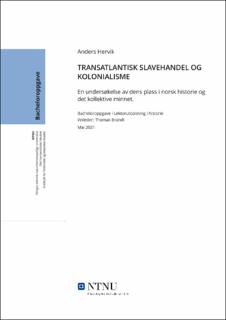| dc.contributor.advisor | Brandt, Thomas | |
| dc.contributor.author | Hervik, Anders | |
| dc.date.accessioned | 2021-09-13T16:07:31Z | |
| dc.date.available | 2021-09-13T16:07:31Z | |
| dc.date.issued | 2021 | |
| dc.identifier | no.ntnu:inspera:80117600:37532045 | |
| dc.identifier.uri | https://hdl.handle.net/11250/2775703 | |
| dc.description.abstract | Målet i denne oppgaven er å bygge en grunnleggende forståelse for norsk koloni- og slavehistorie, samt å undersøke hvilken plass denne delen av historien har i dagens kollektive minne og diskurs. Oppgaven starter med å undersøke den generelle bakgrunnen for at europeiske stater begynte å handle med Asia, Afrika og Amerika fra slutten av 1400 – tallet, og kort hvordan og hvorfor europeerne etterhvert begynte å etablere kolonier over store deler av verden. Etter det generelle bakteppet er etablert tar oppgaven for seg den dansk-norske kolonihistorien i Asia, Amerika og Afrika, med et hovedfokus på Amerika og Afrika. Særlig triangelfarten mellom Danmark-Norge, handelsstasjoner på Gullkysten og de dansk-norske øyene i Karibien vektlegges. Hvordan trekanthandelen fungerte blir eksemplifisert med slaveskipet Fredensborgs reise fra København via Sørlandet til Christiansborg på Afrikas vestkyst, videre til St. Croix og til slutt skipets forlis på utsida av Tromøya. Oppgaven finner videre at norsk koloni- og slavehistorie generelt sett har blitt viet lite oppmerksomhet innen norsk historieforskning. Bakgrunnen for dette er sannsynligvis at det har vært to konkurrerende syn, hvorvidt Norge selv var en koloni eller kolonist. Denne oppgaven konkluderer med at Norge har om ikke direkte, men utvilsomt indirekte, vært en kolonimakt. I tillegg til at norsk koloni- og slavehistorie har blitt viet liten oppmerksomhet fra historikere, har også temaet en liten plass i det norske kollektive minnet. Oppgaven presenterer derfor tre ulike faktorer for å belyse temaet ytterligere: skolen, populærkultur og faghistorikere. En av årsakene til at nettopp temaet norsk koloni- og slavehistorie bør vies mer oppmerksomhet er for å sikre at den norske samfunnsdebatten om rasisme, kolonihistorie og fremmedgjøring gjøres med bakgrunn i nettopp norsk historie. For det er sentralt at også skyggesidene av norsk historie er en del av den offentlige diskursen. | |
| dc.description.abstract | The ambition of this assignment is to create an elemental understanding of the Dano-Norwegian colonial empire and it´s part in the transatlantic slave trade. The assignment is also trying to figure out what role this part of Norwegian history is playing in todays Norway. First the general background of how and why the European powers started to trade with Asia, America and Africa by using the ocean is presented. In addition, the reason why they took part in the slave trade and the reason behind the establishment of colonies in every corner of the globe is explained. After the general background is established the assignment explores the Dano-Norwegian colonial empire in Asia, Africa and America, with a main focus on the triangle trade. Continuing on, the voyage of the slave ship Fredensborg is presented to give an example of the transatlantic slave trade. We follow the ship's travel from Copenhagen to the African west coast and then to the island of St. Croix, before the ship returns to Europe and sinks off the coast of southern Norway. The assignment then tackles the issue of whether or not Norway has a colonial past and finds that this part of Norwegian history has not received much attention from scholars. According to a number of sources there has been two opposing views in Norwegian history: whether Norway was a colony itself or if Norway took part in a global, colonial empire. This assignment concludes that Norway and Norwegians took part in the transatlantic slave trade and the Dano-Norwegian colonial empire, even though we were a part of a union with Denmark. Dano-Norwegian colonial- and slave history has not been given much attention from intellectuals, nor been a part of the Norwegian general memory of its own past. To tackle current issues of racism and debates around colonial history the assignment concludes that this part of Norwegian history should play a bigger role in the general memory of the Norwegian people. Therefor three different factors are identified that could increase the general populations insight in Norwegian colonial and slave history: schools, popular culture and historians. | |
| dc.language | nob | |
| dc.publisher | NTNU | |
| dc.title | Transatlantisk Slavehandel og Kolonialisme:
En undersøkelse av dens plass i norsk historie og det kollektive minnet. | |
| dc.type | Bachelor thesis | |
